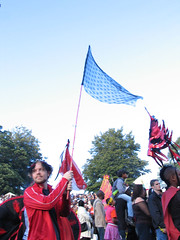I haven't mentioned advice much on this blog (just in 4 or 5 posts). It's a bit of a tricky subject for advocates. I'd even go so far as to say that there's a bit of conflict there, although it's usually quite a friendly sort of conflict...
Certainly it's very common to see the statement, often in the middle of definitions of advocacy, that advocates don't give advice. I've always been at the forefront of arguing this point, partly because of the way I got into advocacy through more informal community work, and partly because of the way one local advice centre insisted that they did advocacy too, so there was no need for a separate advocacy scheme... Words fail me, almost.
Moving swiftly on, it is important that we differentiate our practice from advice work for at least two main reasons:
- Advice work has become heavily regulated over the years. Now you need loads of training, loads of procedures, and loads of monitoring. Advocacy is, and needs to remain, simpler than this.
- There's plenty of people out there wanting to hand out advice - proper regulated advice, professional opinion, or informal 'caring' advice. The problem is that the people who need advocacy can never get away from all the advice and begin to talk about what they really want. Advocacy needs to continue to support these voices.
On the other hand, despite the clear problems with falling into advice work, many people still find the separation from advice both difficult to understand, and difficult to do in practice. I've also recently had to admit coming across lots of situations where the line is a bit more blurred than I thought it was. Take these two examples:
- Working with someone who has been in the care system for many years: they've expressed a problem, explored a range of options, could be on the brink of making a decision, but they still insist on taking your advice...
- Or someone who just gets angry whenever they meet a professional: you can talk to them sensibly in private, but however much you plan together what to say, when it comes down to it they just lose control and ruin all their plans...
There are many more examples, but these are interesting because in the first example the advocate is being asked for advice against their will, and in the second example the advocate could easily get frustrated and want to impose more control than they would normally think reasonable.
There's at least a third general example too: when you are asked to do an independent check on a decision using a best-interests approach (especially in non-instructed advocacy, and what about if you want to bring a third option into the field?). I think this is the most problematic example, and it needs another post.
My conclusion when thinking about these issues and giving advice has to be pragmatic in the end: we should be able to work with people wherever possible, and we shouldn't let abstract principles get in the way unnecessarily. The first reason advocacy doesn't give advice is because it needs to remain simpler than the current state of advice work. For the same reason, we need to be able to identify for ourselves those boundary points where simplicity demands that we relent and start giving advice for a while.





